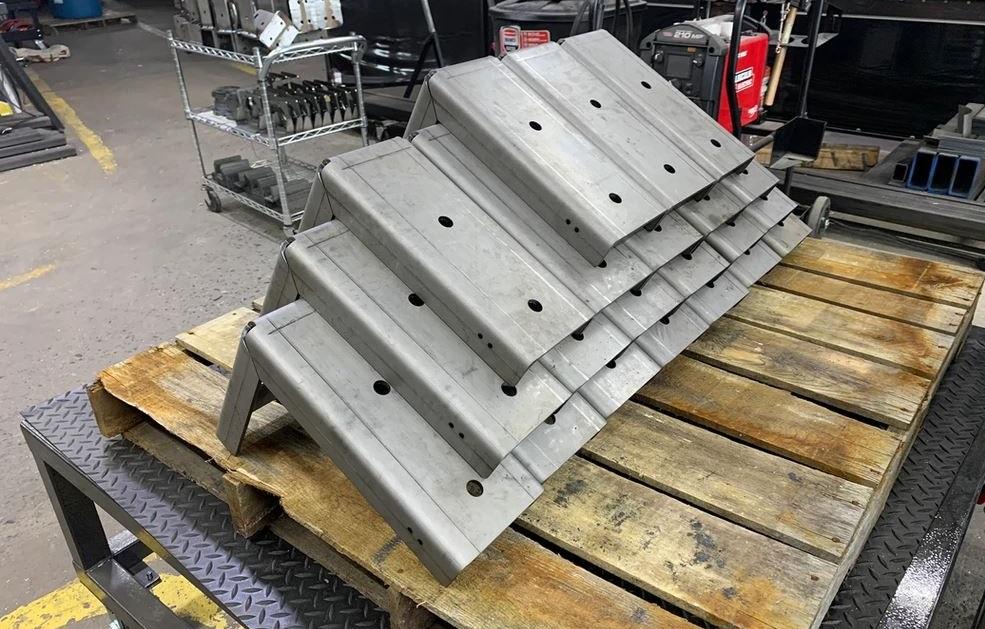Editor-in-Chief
- FMA
- The Fabricator
- FABTECH
- Canadian Metalworking
Categories
- Additive Manufacturing
- Aluminum Welding
- Arc Welding
- Assembly and Joining
- Automation and Robotics
- Bending and Forming
- Consumables
- Cutting and Weld Prep
- Electric Vehicles
- En Español
- Finishing
- Hydroforming
- Laser Cutting
- Laser Welding
- Machining
- Manufacturing Software
- Materials Handling
- Metals/Materials
- Oxyfuel Cutting
- Plasma Cutting
- Power Tools
- Punching and Other Holemaking
- Roll Forming
- Safety
- Sawing
- Shearing
- Shop Management
- Testing and Measuring
- Tube and Pipe Fabrication
- Tube and Pipe Production
- Waterjet Cutting
Industry Directory
Webcasts
Podcasts
FAB 40
Advertise
Subscribe
Account Login
Search
Dynamic Metal blossoms with each passing year
A part-time creative outlet transforms into a full-blown metal fabrication operation
- By Dan Davis
- April 12, 2024
- Article
- Shop Management
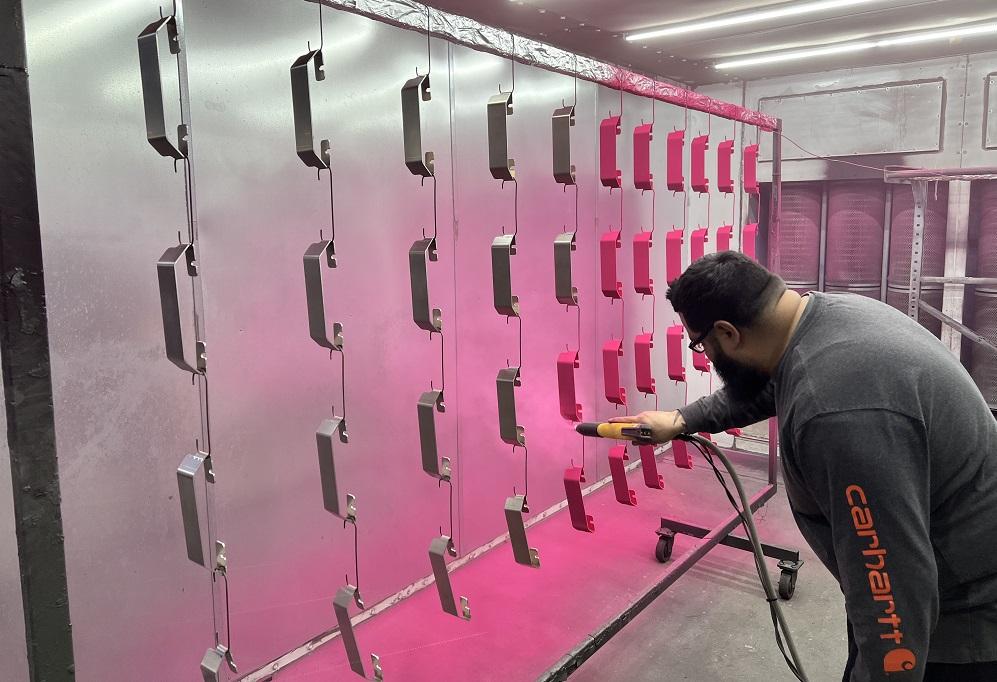
Powder coating has been a DMI offering since the very early days of the business. Dynamic Metal Innovations
“Don’t ever buy me flowers. I don’t like that they die.”
Those fateful words from his then-girlfriend marked a small win for Scott Hartrick. He didn’t have to worry about ever buying flowers, which he thought were expensive to start. What he didn’t realize was that this decision would greatly influence his future.
To mark his one-year anniversary with Tracy, who would later become his wife, Hartrick decided to give her the gift of an everlasting bouquet. He decided to use his hobbyist welding skills to make a dozen red roses out of cheap spoons and steel pieces. He also spray-painted them clear to prevent them from rusting. After several hours of fabrication, he had a gift that wouldn’t deteriorate because of lack of sunshine or water.
That first metal bouquet would be the first step on the way to launching a business that would then be the foundation for a much larger metal fabricating operation, known today as Dynamic Metal Innovations in Emmaus, Pa. Not everything started out smelling like roses, however.
Embarking on a New Career
Hartrick was two years into engineering studies at Penn State University in the mid-2000s when he got a call from the local power company. It had noticed his online resume and wanted to know if he would be interested in interviewing for a job. The allure of a full-time job was tempting, but the promise to pay for his last two years of school sealed the deal. Hartrick became an engineer with PPL Corp. and finished his engineering studies on a part-time basis.
Working a regular 7 a.m. to 3:30 p.m. schedule catered to a somewhat normal life, and the job’s compensation was good. But Hartrick still yearned for something a bit different from his career, particularly after wrapping up a five-year restoration of a 1988 Ford Mustang GT with a 900-HP V8 engine. Looking back at that time, Hartrick said that the hands-on work involved in restoring his show car likely occupied his mind in a way that he could overlook the shortcomings of his day job. However, when that project was completed, his mind was looking for another outlet.
“I didn’t want to do what I was doing for another 40 years,” he said.
Luckily, he had something he could focus on—metal flowers. This work didn’t result in something that could go 0 to 60 mph in a matter of seconds, but it did bring a long-lasting happiness to people who got the fabricated foliage.
Hartrick went to work trying to fine-tune his skills. As part of this continuing education, he decided to turn to aluminum as his working material of choice because it could be formed much more easily than steel and provided protection against rusting. The big challenge was learning to weld aluminum, which he had never done. Not only had he not worked with the material, he had experience only with gas metal arc welding. He purchased a Lincoln Electric TIG 200 welding machine and started practicing, with some help from “YouTube University,” as Hartrick called his DIY training.
“The first time that I tried to weld 0.040-in. aluminum sheet metal to 0.25-in.-thick rod, it didn’t go well,” he said.
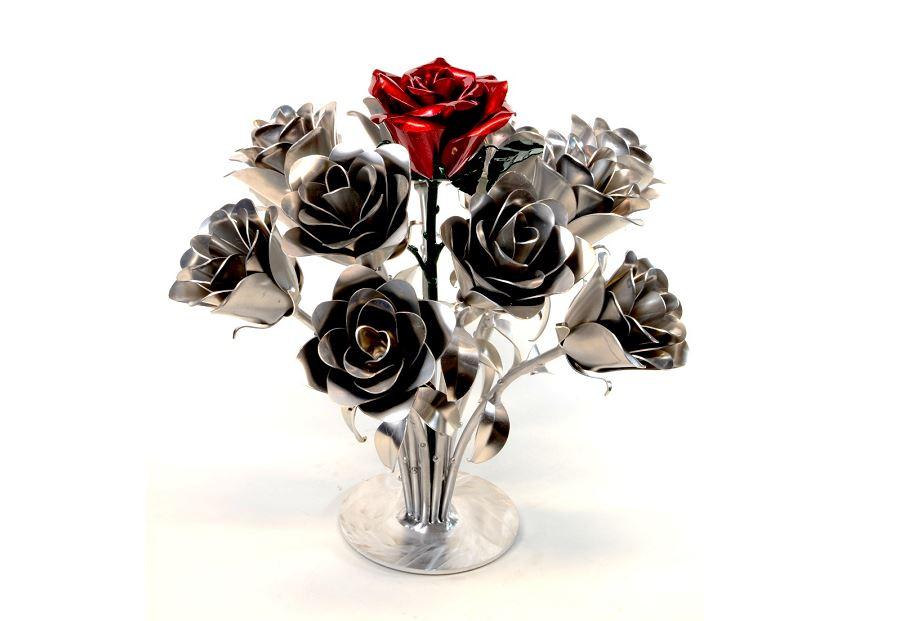
Aluma Flowers, a business focusing on the production of aluminum flowers, paved the way for the founding of Dynamic Metal Innovations, a job shop in its fifth year of business. Aluma Flowers
Hartrick persevered and honed his gas tungsten arc welding skills to the point that he had confidence in delivering consistent quality in his metal flowers. Soon he was using CAD to create flat patterns and having them laser cut. He also started using a small powder coating kit to add more vibrant color to the metal creations.
He built a website and purchased Facebook ads to generate publicity and interest. Aluma Flowers was a full-blown business.
With this in mind, Hartrick left his job in early 2017, and with some financial assistance thanks to his 401(k), he began fabricating the aluminum flowers full time. He welded the flowers in the garage and powder coated them in the basement. Tracy helped out with shipping.
When some of the pieces ended up on the kitchen table, Hartrick said that the business had outgrown their home. That’s how the company ended up in an 800-sq.-ft. unit that was once part of a storage facility. It didn’t have running water, but it did provide the space where the work could take place and not disturb someone trying to cook dinner.
Hartrick also brought on his first employee, Shawn Surman, who helped with forming and generally assisted in running the business. He is now an equity owner in Dynamic Metal Innovations.
The facility also housed some other small companies, including a hydraulic repair and service shop. Hartrick occasionally provided welding services for his neighbor, and it got him to thinking that this might be a good way to supplement the fabrication of flowers.
Additionally, because he had a larger curing oven in his new shop, he could take on more powder coating work. The 6- by 4- by 4-ft. oven, a powder coating booth, and a legit used Gema powder gun was perfect for applying a finish not only to the flowers, but also to things like automotive parts.
That’s when he first reached out to his former college engineering classmate Mark Sternat about possibly doing something together. The seeds from the flower fabrication business were germinating and about to give bloom to something very different.
Going the Job Shop Route
By 2018, Aluma Flowers needed more space. While there was no commitment to becoming a full-fledged job shop at this time, Hartrick’s business had definitely gone beyond flower-related fabricating.
Simultaneously, Hartrick was thinking about bringing the cutting process in-house. He had blanks cut in Alabama, where the laser-cut parts were more affordable than what was quoted in the Philadelphia area, and he developed prototypes for new flowers on a small CNC table that worked with his Hypertherm plasma cutter.
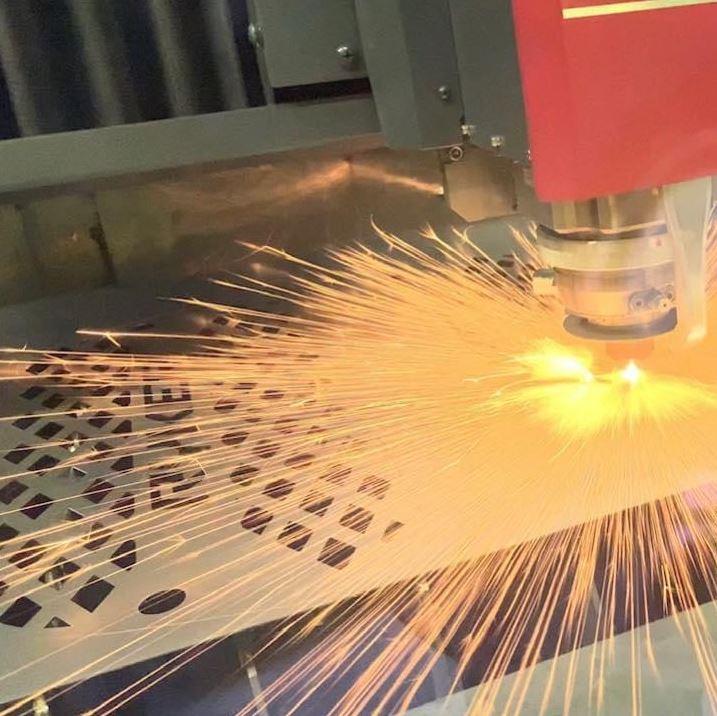
DMI’s Mitsubishi eX-F 6-kW laser cutting machine enabled the shop to start cutting thicker metals that the previous 1.5-kW laser couldn’t handle. Dynamic Metal Innovations
“I wasn’t very good at managing my inventory,” Hartrick said. “You’d expect to have some laser-cut flats in a bin on a shelf, and I would go to the bin and find there’s only two pieces left.”
He didn’t consider plasma cutting because the process creates a bit of mess when aluminum is involved. He loved the way the laser-cut parts looked, so he started investigating the purchase of a laser cutting machine.
After consulting with Sternat, who would later join the company in early 2019, he decided to buy an imported 1.5-kW laser cutting machine with an IPG source, which came with a price of just over $100,000. Because Aluma Flowers had been in business for two years, he was able to get financing for the machine, which was the company’s largest investment to that point.
“We just needed a way to make more money, and that laser was going to help us do that,” Hartrick said. The shop purchased a basic press bake and leaned on Fusion 360 as a design tool. Dynamic Metal Innovations (DMI) was now up and running.
To get work for the laser cutting machine, Hartrick posted a note to Facebook and got responses from 40 people. Sternat handled the active sales effort, sending out emails and making cold calls. Surman quickly became Hartrick’s right-hand man and was involved in all aspects of the job shop work.
Small jobs trickled into the shop, and then a big opportunity presented itself. A nearby telecom company had been getting its fabricated parts from a source in New Jersey and wanted to see if the new kids on the block could handle its work. Given that the shop didn’t have the major lead time as other metal fabricators in the area, DMI got the chance to prove itself.
That connection proved fortuitous because in the early part of 2020, when the world started to shut down because of the pandemic, DMI remained open. Its work for the telecom industry was deemed essential. In fact, 2020 ended up being another year of growth for the small company.
“We were growing quickly, but we also realized that we were turning away a lot of thicker jobs. The laser just couldn’t handle that work,” Hartrick said.
The 1.5-kW laser couldn’t go beyond 0.125-in. aluminum and could barely manage 0.50-in. steel and 0.25-in. stainless steel. Meanwhile, requests for work involving 0.75-in. plate and 0.1875-in. aluminum were becoming more frequent.
Big League Technology
After researching some of the more well-known names in the North American laser cutting industry, DMI ended up working with Mitsubishi Laser. The company flew him out to the showroom in Elk Gove Village, Ill., and he had the chance to see the equipment in action.
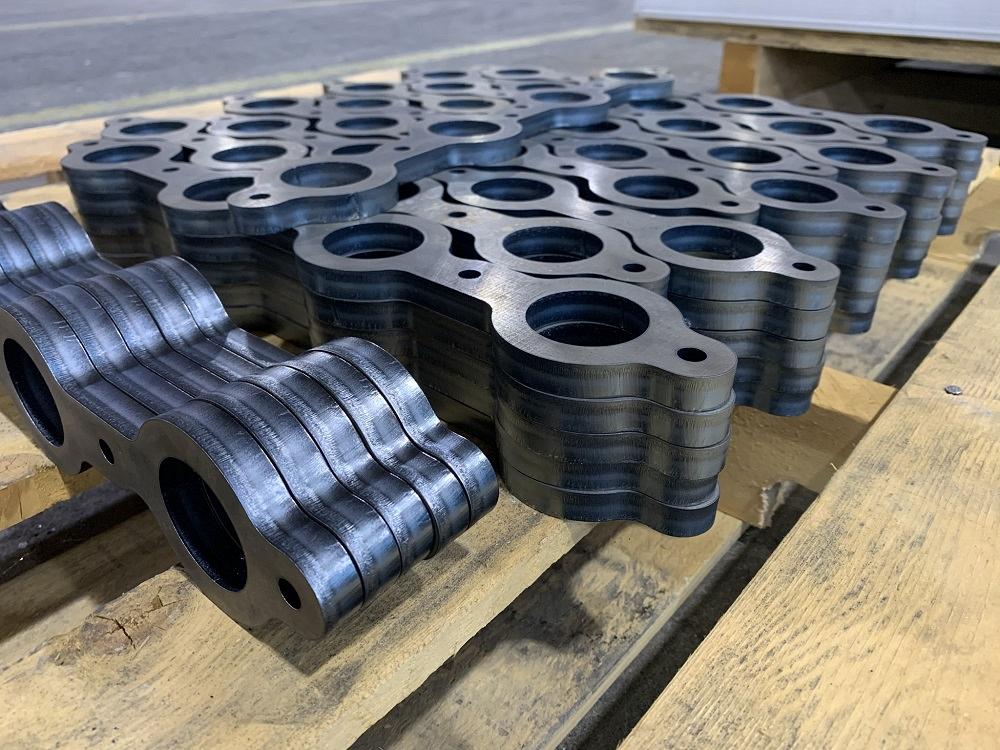
With the ability to cut thicker parts, DMI was able to take on work that it had previously been turning away. Dynamic Metal Innovations
Hartrick said that Mitsubishi was taking a chance on DMI, being that the shop was still a relatively new company. However, DMI had demonstrated an ability to grow the business: $250,000 in 2019 and $750,000 in 2020. Because Mitsubishi had its own financing arm, DMI didn’t need outside approval for the $650,000 loan.
“It was kind of a putting the cart before the horse situation,” Hartrick said. “But that’s what you need to do because if you wait for the right opportunity and then decide to purchase the technology to do it, it’s already too late.”
In early 2021, DMI began looking like a modern metal fabricating shop. The Mitsubishi eX-F 6-kW laser cutting machine could cut 1-in. carbon steel, 1-in. stainless steel, and 0.75-in. aluminum. It also could do it much more quickly than the 1.5-kW laser cutting machine it replaced.
Around this same time, DMI also purchased a used servo-electric, 70-ton press brake with a 6-axis backgauge. The brake allowed DMI to bend parts within a 0.005-in. tolerance on a consistent basis. Offline programming also helped to improve productivity at the press brake and laser.
A Few More Adjustments
As general fabricating work became the major revenue generator for DMI, Hartrick decided to put Aluma Flowers on the back burner. No more money was going to be spent on social media and web advertising, but the team would respond if digital orders were placed.
Aluma Flowers was not a struggling business, generating $500,000 in revenue in 2020. But it didn’t really reflect the more complex and higher-margin work with which DMI was increasingly involved.
Today, Tracy handles most of the aluminum flower fabrications, from processing the orders to actually creating the floral pieces. Hartrick said that she’s been instrumental in creating some new offerings, such as an aluminum succulent.
“She won’t admit it, but she is a lot more creative than I am,” he said.
On the DMI side, the company took on an equity partner in 2022 that provided some much-needed guidance and financial support. Hartrick said that the partner’s experience in manufacturing has been a “massive resource” because they know what contributes to smooth operations and intelligent human resource management.
The cash infusion also helped DMI add a 150-ton Mitsubishi Diamond BH 13530 press brake with a 10-ft. bed. The new brake could accommodate larger parts than the older servo-electric brake and gave the shop the ability to deliver more consistent bending results.
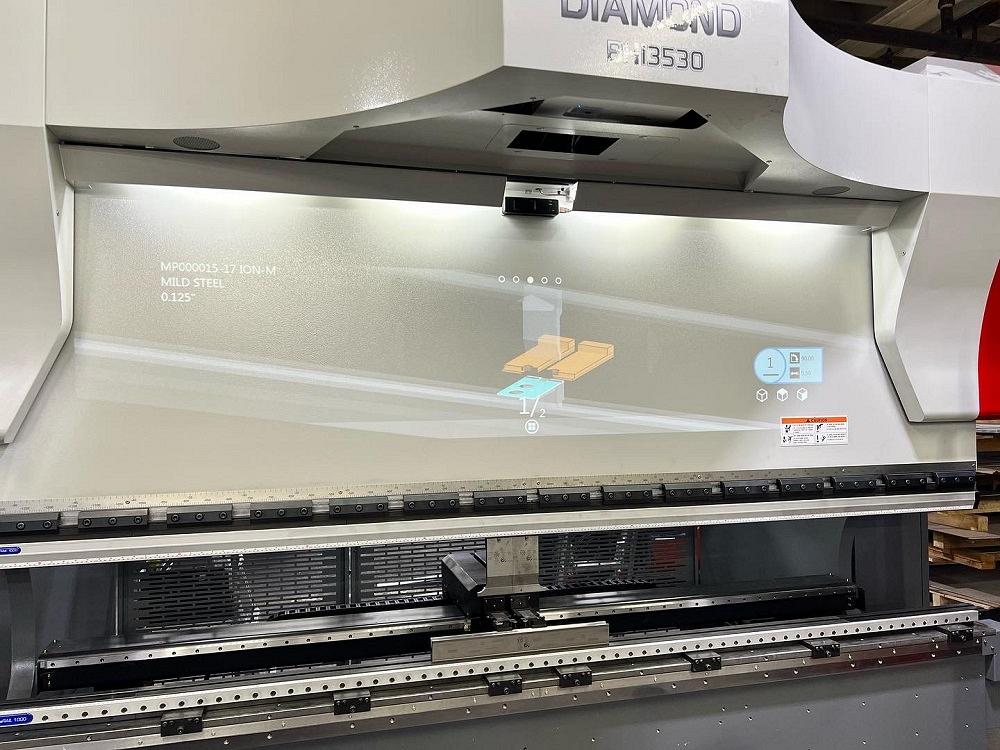
The Mitsubishi Diamond BH 13530 press brake can project a simulation of the bend sequence onto the ram so that the operator can directly refer to the visual aid for bending guidance. Dynamic Metal Innovations
Setting the Stage for Long-Term Growth
By summer 2024, DMI should be in a new building. Hartrick said the search for a new facility hasn’t been easy with the increased demand for industrial/warehousing space on the East Coast. But the company finally found a building that will give it 25,000 sq. ft. to spread out and plan for a more efficient layout.
“As we have grown, it’s really put pressure on our operations. The growth has exposed inefficiencies that we need to address,” Hartrick said.
The team has tried to be more efficient in moving work-in-process, but the tight confines of the current space have made it hard to maximize that effort. DMI also has been cognizant about keeping machinery busy, but not at the expense of creating a bottleneck further downstream.
One of the tools that has helped to improve communication with the team has been the implementation of Paperless Parts software. In addition to streamlining a key part of the quoting and estimating process, the software has allowed for more collaboration among all DMI parties. Everyone can have real-time access to the same files and drawings. All project conversations are kept in one location, providing an easy-to-search resource. Assignments can be made from the platform, and projects can be tracked until final shipment. Not as many surprises are hitting the DMI shop floor.
“I’m a big fan of automation. Anything that can help to reduce manual inputting of information is good,” Hartrick said.
DMI has found similar success with Fulcrum ERP, a 2021 implementation. Information is pulled from accepted quotes and used to update purchasing, schedule jobs, and create forms for operations like shipping. Users also are able to access live data on the shop floor to get updates on jobs and overall operations.
These automation tools will prove to be helpful as DMI continues to grow—both at the office and at home. DMI now has 16 employees. Hartrick has a young son, and Sternat has twins. The decisions made today touch many more lives, which is a lot different compared to when just two people were working in a former storage unit.
“We try and create a work environment that everyone can enjoy. We want to support our employees as best as we can,” Sternat said.
Growing the business is a good way to do that. Employees can enjoy the financial success of an expanding business and take on more responsibilities as they present themselves.
No one likes to see a flower die, and the same holds for a business. Like those aluminum flowers, DMI is demonstrating a strength that will allow it to have a long life.
About the Author

Dan Davis
2135 Point Blvd.
Elgin, IL 60123
815-227-8281
Dan Davis is editor-in-chief of The Fabricator, the industry's most widely circulated metal fabricating magazine, and its sister publications, The Tube & Pipe Journal and The Welder. He has been with the publications since April 2002.
Related Companies
subscribe now

The Fabricator is North America's leading magazine for the metal forming and fabricating industry. The magazine delivers the news, technical articles, and case histories that enable fabricators to do their jobs more efficiently. The Fabricator has served the industry since 1970.
start your free subscription- Stay connected from anywhere

Easily access valuable industry resources now with full access to the digital edition of The Fabricator.

Easily access valuable industry resources now with full access to the digital edition of The Welder.

Easily access valuable industry resources now with full access to the digital edition of The Tube and Pipe Journal.
- Podcasting
- Podcast:
- The Fabricator Podcast
- Published:
- 04/16/2024
- Running Time:
- 63:29
In this episode of The Fabricator Podcast, Caleb Chamberlain, co-founder and CEO of OSH Cut, discusses his company’s...
- Trending Articles
Tips for creating sheet metal tubes with perforations

Supporting the metal fabricating industry through FMA

JM Steel triples capacity for solar energy projects at Pennsylvania facility

Fabricating favorite childhood memories

Omco Solar opens second Alabama manufacturing facility

- Industry Events
16th Annual Safety Conference
- April 30 - May 1, 2024
- Elgin,
Pipe and Tube Conference
- May 21 - 22, 2024
- Omaha, NE
World-Class Roll Forming Workshop
- June 5 - 6, 2024
- Louisville, KY
Advanced Laser Application Workshop
- June 25 - 27, 2024
- Novi, MI
























